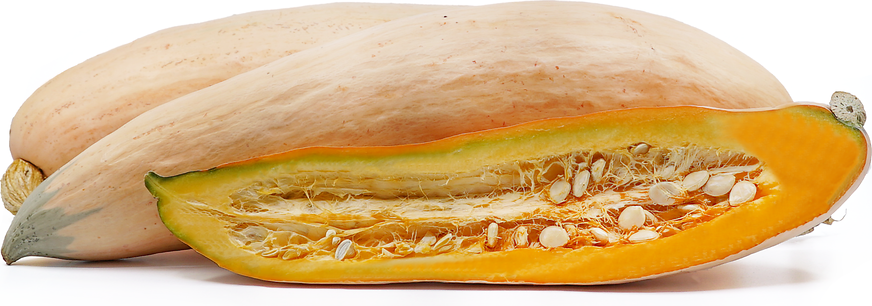


Georgia Candy Roaster Squash
Estimated Inventory, lb : 0
Description/Taste
North Georgia Candy Roaster squash can grow to be very large, averaging 30 to 45 centimeters in length and 10 to 15 centimeters in diameter, and has an elongated, straight to slightly curved shape with tapered ends. The 8 to 15-pound squash has smooth, semi-thin skin, covered in shallow striations, and bears variegated hues of pink, orange, tan, gray, green, and blue. Underneath the surface, the flesh is yellow-orange, fine-grained, and crisp, encasing a long, central cavity filled with stringy fibers and flat, cream-colored seeds. North Georgia Candy Roaster squash develops a smooth and creamy consistency when cooked and has a high sugar content, creating a sweet, nutty flavor. It is important to note that as the squash is kept in storage, it will develop an even sweeter taste.
Seasons/Availability
North Georgia Candy Roaster squashes are available in the fall through winter.
Current Facts
North Georgia Candy Roaster squashes, botanically classified as Cucurbita maxima, are an American heirloom variety belonging to the Cucurbitaceae family. The rare, elongated squashes have been cultivated and preserved through the Cherokee Nation since the 1800s and were highly favored as a nutrition source during the cold winter months. The indigenous squash was also traditionally planted along with corn and beans in Cherokee gardens, known as the famous three sisters crop sowing technique. In the modern-day, North Georgia Candy Roaster squashes, also known as Candy Roaster squashes and Georgia Candy Roaster squashes, are a specialty variety that is not commercially grown due to its open-pollinated nature. The squashes can be pollinated by other squash varieties within a mile radius, making it challenging to keep the cultivar pure. As a result of this trait, there are over forty known varieties and many other hybrids that are generally categorized under the Candy Roaster name, making it difficult for farmers to preserve the true seed. Despite these cultivation hardships, farmers and home gardeners throughout the Southern United States consider the rare variety valuable enough to be preserved and cultivate the squash for its sweet, smooth flesh.
Nutritional Value
North Georgia Candy Roaster squashes are an excellent source of vitamins A and C, which are antioxidants that can boost collagen production within the skin, reduce inflammation, and strengthen the immune system. The squashes are also a good source of fiber to regulate the digestive tract and provide lower amounts of iron, calcium, and B vitamins.
Applications
North Georgia Candy Roaster squash is best suited for cooked applications, including mashing, roasting, stuffing, frying, boiling, and baking. The flesh develops a soft, smooth, and creamy texture when cooked and has a sweet flavor similar to a sweet potato, making it suitable for sweet and savory dishes. North Georgia Candy Roaster squash can be peeled before or after cooking, and the thin skin is easily removed. The flesh can be pureed and incorporated into butter to spread over toast or mixed into baked goods such as bread and muffins. The squash’s sweet flavor also blends well in pies and can be used as a twist on the traditional pumpkin pie. In the early 1900s, North Georgia Candy Roaster squash was once the ingredient of choice for pies during Thanksgiving. In addition to desserts, the flesh can be cubed and roasted as a side dish, tossed into casseroles, soups, and stews, or cooked and stirred into pasta. Roasting develops a rich and sugary caramelization to add texture to the soft flesh. The seeds can also be roasted and eaten as a snack. North Georgia Candy Roaster squashes pair well with spices such as curry, cinnamon, cloves, and nutmeg, herbs such as sage, thyme, and rosemary, cranberries, maple syrup, and nuts such as walnuts, almonds, and pecans. Whole squashes will keep up to six months when stored in a cool and dark location. The squash’s flavor will also sweeten in prolonged storage.
Ethnic/Cultural Info
North Georgia Candy Roaster squash was the featured variety in Slow Food Asheville’s 2018 Heritage Food Project. Each year, Slow Food Asheville selects one cultivar, specific to their region, to raise awareness, expand cultivation, and gather the community to celebrate and share recipes. During the project, over 4,000 North Georgia Candy Roaster squash seeds were distributed for free to growers and home gardeners at farmer’s markets throughout the city. Slow Food Asheville also offered educational talks on how to grow the heirloom squash during the season to encourage growers to diversify their gardens. At the end of the season, each grower donated one North Georgia Candy Roaster squash to Twin Leaf Brewing, the chosen partner for the event, where they developed a beer using the squash’s flavor mixed with cranberry. The final October event was known as the Candy Roaster Rendezvous, and participants gathered together to celebrate the work that was done to save and preserve the variety for future use. Participants were also able to sample the custom beer, and a potluck was held featuring North Georgia squash inspired recipes, including roasted side dishes, pies, and casseroles.
Geography/History
North Georgia Candy Roaster squash was first cultivated and bred by the Cherokee Nation in the 19th century. The Cherokee Nation valued the variety for its long shelf life and planted the squash throughout present-day Western North Carolina, Northern Georgia, and Eastern Tennessee. In 1925, the heirloom variety was featured in an article in the Charlotte Observer, expanding cultivation to farms and households outside of the Cherokee Nation. Today North Georgia Candy Roaster squashes are still of cultural importance to the Cherokee Nation, and growers are saving the seeds in the nation’s seed bank within the natural resources department. The rare squashes are also grown through specialty farms in the Southern United States and California and are sold through farmer’s markets. In addition to small farms, the variety is sold through online seed catalogs for home garden cultivation.
Recipe Ideas
Recipes that include Georgia Candy Roaster Squash. One




